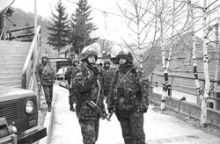Ukraine’s chairing the UN Security Council coincided with yet another aggravation of the Balkan conflict but this time in Macedonia, the only former Yugoslav country which had not yet had a war. The Security Council extraordinary session, convened on Ukraine’s initiative, and NATO leadership statements have not yet defused the situation: each day brings reports about clashes between the Macedonian armed forces and Albanian rebels in the Macedonian- Yugoslav border area.
The Macedonia-Kosovo border encounters coincided with the revival of Albanian groupings in southern Serbia. On March 8 NATO Secretary General Lord Robertson announced an unprecedented decision by the alliance to allow limited Yugoslav army units, tightly controlled by the West, to enter the buffer zone in southern Serbia near the Macedonian border, a thing categorically banned when Milosevic was still in power. The statement refers to the Albanian groupings in southern Serbia and Macedonia as extremists, a term previously never applied to the Kosovo Liberation Army (KLA). Meanwhile the Albanians, are strongly protesting this latest NATO decision.
Lord Robertson’s statement obviously brings us again to the conclusion that Western policy toward Yugoslavia and Kosovo was clearly wrong. This can also raise the question where the Albanians in Kosovo, southern Serbia, and Macedonia could get up-to-date Western weapons, including heavy mortars. Why did these weapons manage to pass so easily through the KFOR checkpoints in Kosovo to be further employed outside this area? Why does the West give such differing assessments of the similar methods of action by the KLA and groupings in southern Serbia and Macedonia? And why do the leaders of the Albanian groupings keep telling the Western press that they respect and will never draw their weapons against the Americans? Does this mean they could do so against others, including Ukrainian and European soldiers? The Albanian demands differ very little from those we heard during the Kosovo crisis: broad autonomy, involvement in public administration, and education.
One can suggest that the Balkan developments have spun out of control (to God knows where) and are now unfolding in a direction undesirable for NATO and the West as a whole. NATO’s belated preoccupation is, of course, better than the cheerful announcements about the situation normalizing with each passing day.
President Boris Trajkovski of Macedonia phoned Leonid Kuchma to thank him for the initiative to convene an extraordinary session of the UN Security Council, for supporting the Macedonian leadership’s efforts to settle the conflict, and for the contribution Ukraine is making to international peacekeeping efforts in the Balkans.
The Ukrainian peacekeepers stationed in Kosovo are serving in the immediate vicinity of the epicenter of the most recent events and are naturally preparing for all possible contingencies. Today nobody is ruling out the possibility of making a decision to revise the nature of their duties and perhaps reinforce their strength with combat units. Everything will depend on further developments and the stands of the Security Council members.
On the other hand, Ukraine has received a chance to show off the talents of its diplomacy in settling the conflict by coordinating Security Council efforts and, accordingly, to restore the prestige of the UN and itself.







